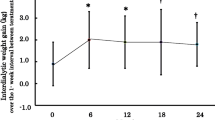Abstract
The effect of the diet poor in protein and containing adequate quantity of essential amino acids in the treatment of chronic uremia is discussed. A diet of high caloric value contains 18–24 g of protein, — this quantity comprising also the minimum daily requirement of essential amino acid. Under the effect of the diet the uremic symptoms subside or disappear completely, and the value of the nonprotein nitrogen of the serum decreases. The good result is due not to the improvement of the kidney function, but the diet produces in the metabolism in the metabolism a favourable change. This new, special diet is an important factor of the complex anti-uremic treatment.
Similar content being viewed by others
References
Berlyne, G. M., Shaw, A. B., Nilwarangku, S.: Dietary treatment of chronic renal failure.Nephron 2, 129 (1965).
Borst, J. G. G.: Protein catabolism in uraemia.Lancet 1, 824 (1948).
Bull, G. M., Joekes, A. M., Lowe, K. G.: Diet in chronic renal failure.Lancet 2, 229 (1949).
Giordano, C.: Use of exogenous and endogenous urea for protein synthesis in normal and uraemic subjects.J. Lab. clin. Med. 62, 231 (1963).
Giovanetti, S., Maggiore, Q.: A low-nitrogen diet with proteins of high biological value for severe chronic uraemia.Lancet 1, 1000 (1964).
Kerr, D. N. S., Robson, A., Elliott, R. W., Ashcroft, R.: Diet in chronic renal failure.Proc. roy. Soc. Med. 10, 115 (1967).
Kluthe, R., Quirin, H., Oechslen, D., Wenig, A.: “Kartoffel-Ei-Diät” bei fortgeschrittener Niereninsuffizienz.Med. Klin. 62, 1020 (1967).
Orlowski, T., Polec, R.: Potato diet in terminal renal failure. Proc. EDTA III, 1966.
Pintér, J., Karátson, A., Wölfer, E., Mihalecz, K.: Az alacsony fehérjetartalmú diéta alkalmazásának jelentősége a chronicus veseelégtelenség végstadiumának kezelésében.Orv. Hetil. 110, 225 (1969).
Rose, W. C.: The utilization of nitrogen in the synthesis of non-essential amino acids in vivo.Fed. Proc. 8, 546 (1949).
Rose, W. C., Dekker, E. E.: Urea as a source of nitrogen for the biosynthesis of amino acids.J. biol. Chem. 223, 107 (1956).
Schloerb, P. R.: Essential L-amino acid administration in uremia.Amer. J. med. Sci. 252, 54 (1966).
Shaw, A. B., Bazzard, F. J., Booth, E. M., Nilwarangku, S., Berlyne, G. M.: The treatment of chronic renal failure by a modified Giovanetti diet.Quart. J. Med. 34, 237 (1965).
Suc, J. M., Rumeau, M., Ton-That Hung, Conte, J., Meriel, P., Bernard-Griffiths, J.: Régimes pauvres en protéins, complétés en acides aminés essentiels dans le traitement au long cours de l'insuffisance rénale chronique grave. Proc. EDTA III. 1966.
Traeger, J.: Traitement des insuffisances rénales chroniques par les régimes à faible teneur en protéines.Soc. Nutr. et Diét. Ligue franc. Paris,29, 3 (1965).
Author information
Authors and Affiliations
Rights and permissions
About this article
Cite this article
Rényi-Vámos, F., Rigó, J., Csata, S. et al. Role of diet in the treatment of chronic nephropathies. International Urology and Nephrology 2, 179–186 (1970). https://doi.org/10.1007/BF02125819
Received:
Issue Date:
DOI: https://doi.org/10.1007/BF02125819




